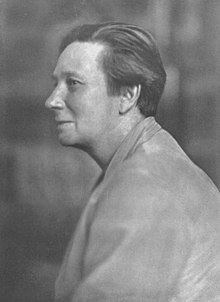Rhoda Erdmann
Anna Maria Rhoda Erdmann (born December 5, 1870 in Hersfeld (Hessen-Nassau), † August 23, 1935 in Berlin ) was a German biologist and cell researcher . She is considered a co-founder of experimental cell biology in Germany.
family
Erdmann was one of three children of Heinrich Erdmann, a teacher and local politician, and his wife Anna Maria, nee Heldmann.
Life
From 1876 to 1886 she enjoyed training at a girls' college in Hamburg , where her father also worked. As a woman, studying science was not naturally open to her, and at her father's request she initially became an elementary school teacher. She passed her teacher examination in 1892 and received further training in humanities from her father. She taught in Berlin from 1901 to 1903. In order to gain access to university, she first had to take a senior teacher examination and then studied zoology, botany, physics and mathematics in Zurich from 1903 to 1908 , and after opening the major German universities for women from 1908 in Marburg , Munich and Berlin. In 1907 she had also made up her degree for the required Abitur.
In 1908 she received her doctorate from Richard Hertwig with a thesis on cytological studies on sea urchin eggs. She then worked from 1909 to 1913 as a research assistant at the Institute for Infectious Diseases with Robert Koch .
From 1913 she worked as a research fellow at Yale University , where she received a position as a lecturer in biology from 1915 to 1916. She then became a Research Associate at the Rockefeller Institute . In 1918 she was arrested as a hostile foreigner on suspicion that her work (the causative agent of avian influenza ; she worked on the active immunization against this disease) wiped out the American chicken population as a foodstuff for the United States. In a lengthy process, she was deported to Germany, where she arrived in 1919. There she built a department for experimental cell research in Berlin, initially at the Charité Institute for Cancer Research . In the same year she founded the journal Archive for Experimental Cell Research , which she published. In 1920 she received her habilitation in protozoology. She gave her inaugural lecture on July 25, 1920 "On the importance of tissue engineering for zoology". In 1922 she published the first German-language textbook on tissue engineering for cancer research.
Erdmann became a non-civil servant associate professor in 1924 (in that year she completed her habilitation in medicine) and in 1929 a civil servant associate professor; thus she was one of the first women in Germany to become professor. On April 1, 1930, her department at the Institute for Cancer Research was converted into an independent university institute for experimental cell research.
Erdmann was arrested by the Gestapo in 1933 for denouncing (she is said to have helped Jews emigrate), but released after two weeks because of the support of her dean. Rumors circulated in her faculty that she was Jewish. For "reasons of principle", she was informed in 1934, that she was no longer allowed to give lectures. She died the following year.
Awards and honors
- In 1997 the Free University of Berlin established the Rhoda Erdmann program as a further education offer for young female scientists.
- The Rhoda Erdmann House of the Humboldt University of Berlin is located on the historic North Campus in Berlin-Mitte and was opened in 2016.
- In Berlin-Grunewald is a park named after her.
- In Munich , a street in the Allach-Untermenzing district was named after her.
Fonts
- Internship in tissue care. Berlin 1922.
- Autobiography (1926), in: Elga Kern (Ed.): Leading Women in Europe , Munich 1999 [1928], pp. 93-107.
literature
- Dietrich Egner: Erdmann, Anna Maria Rhoda. In: New German Biography (NDB). Volume 4, Duncker & Humblot, Berlin 1959, ISBN 3-428-00185-0 , p. 573 ( digitized version ).
- Brigitte Hoppe: The institutionalization of cell research in Germany by Rhoda Erdmann (1870–1935) ; in: Association of German Biologists (Ed.): Biology Today . Supplement to the journal Naturwissenschaftliche Rundschau, No. 366, 1989, no. 7, pp. 2-4, 9
- Sabine Koch: Life and work of the cell researcher Rhoda Erdmann (1870–1935) . Diss. Med. Marburg. 1985.
- Nicole Mayer: Erdmann, Rhoda. In: Werner E. Gerabek , Bernhard D. Haage, Gundolf Keil , Wolfgang Wegner (eds.): Enzyklopädie Medizingeschichte. De Gruyter, Berlin / New York 2005, ISBN 3-11-015714-4 , p. 367.
- Annette Vogt: History of Science: Rhoda Erdmann - a founder of modern cell biology . BIOspektrum 05.18: 561-2, ISSN 0947-0867
Individual evidence
- ↑ a b c d e f g Joyce Harvey & Marilyn Ogilvie (Eds.): The Biographical Dictionary of Women in Science: Pioneering Lives from Ancient Times to the Mid-Twentieth Century , Volume 1. Taylor & Francis, 2000
- ↑ a b Antonius Lux (ed.): Great women of world history. A thousand biographies in words and pictures . Sebastian Lux Verlag , Munich 1963, p. 156.
- ^ Nicole Mayer: Erdmann, Rhoda. 2005, p. 367.
- ↑ Ann Ehrenhofer-Murray: The Rhoda Erdmann House. BIOspektrum 05.18: 362, ISSN 0947-0867
- ^ Name of the Rhoda Erdmann Park. In: press release. District Office Charlottenburg-Wilmersdorf, October 11, 2012, accessed on August 25, 2014 .
- ^ Rhoda-Erdmann-Strasse. www.muenchen.de, accessed on September 13, 2017 .
| personal data | |
|---|---|
| SURNAME | Erdmann, Rhoda |
| BRIEF DESCRIPTION | German biologist |
| DATE OF BIRTH | December 5, 1870 |
| PLACE OF BIRTH | Hersfeld |
| DATE OF DEATH | August 23, 1935 |
| Place of death | Berlin |

